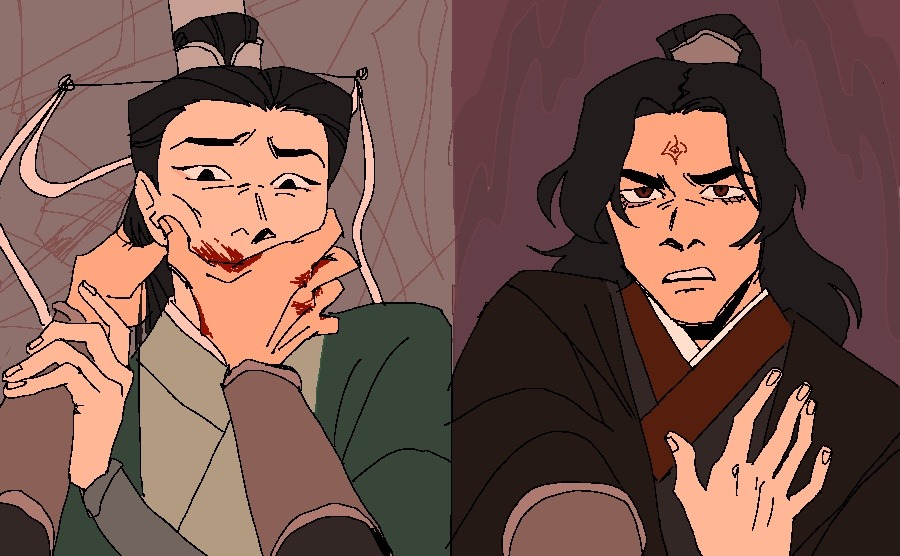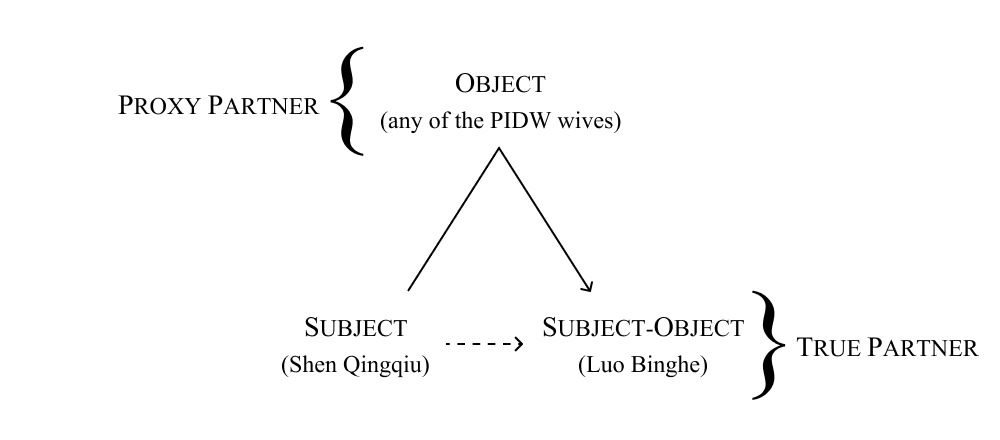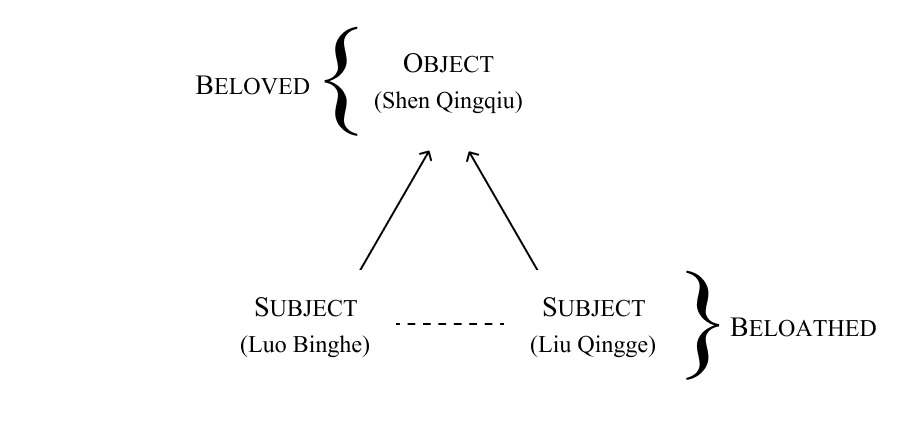Featuring an imperfect case study using my own fanart.
Toxic yuri had a moment on the ailing Twitter/X app over the summer which is very exciting and [ariana grande equality gif] to see, but I want to put forth some critical thoughts for people to consider as part of the yuri zeitgeist.
Because the toxic (I’m being real broad here, think anger, aggression, etc, not just abuse or manipulation) aspect of toxic yuri is something that is comparatively hard to come by in wlw fanwork as opposed to in mlm fanwork, particularly in wlw femswaps that are derived from mlm media.
![[personal profile]](https://www.dreamwidth.org/img/silk/identity/user.png) x_los wrote a critique on the state of wlw femswaps in MDZS fandom circa September 2020 that I think really gets at the odd loss of athleticism and physical capability as part of the alchemical genderswapping, and the tendency for cis wlw femswaps to be domestic, mundane, and soft when the couple that the genderswap is derived from is blatantly not. It’s the kind of genre or tonal shift that isn’t a Thing on its own but is an annoying trend across entire fandoms, the cozy-fying of athletic, martial ships as you turn them into women, and therefore worth examining.
x_los wrote a critique on the state of wlw femswaps in MDZS fandom circa September 2020 that I think really gets at the odd loss of athleticism and physical capability as part of the alchemical genderswapping, and the tendency for cis wlw femswaps to be domestic, mundane, and soft when the couple that the genderswap is derived from is blatantly not. It’s the kind of genre or tonal shift that isn’t a Thing on its own but is an annoying trend across entire fandoms, the cozy-fying of athletic, martial ships as you turn them into women, and therefore worth examining.
I’m going to branch off from the [physicality] aspect of this critique into a [violence and aggression] sub branch because it’s interesting to me and I think it has implications on the original argument. Let’s go.
Take for example Lesbingqiu (lesbian BingQiu from Scum Villain). BingQiu are perfectly set up to be angry and fraught and toxic which they definitionally are in the Jin Lan Arc in the story. During this arc, they have an angry confrontation in an alleyway where Binghe chokes Shen Qingqiu against a wall, stops the blade of Shen Qingqiu’s sword with his bare hand, drags Shen Qingqiu up by the hair, and feeds him his blood (x_los has a GREAT angry fraught lesbingqiu fic that takes place during this arc which I highly recommend).
I have also drawn a scene from this arc. Sorry to use my own fanart but like, it’s right there.

As well as a modern AU wlw scene that is spiritually from the same source

Like if you have any visual literacy at all you can see that the two are the same.
But I’ve found that the angry fraught bathtub drowning lesbingqiu is less popular (by a factor of 7x tumblr notes at time of posting) than the angry fraught blood feeding mlm bingqiu.
I think this is partly because it’s a modern AU and so people see it and go “!!! domestic violence!” which is understandably uncomfortable. But fanart of violent modern AU mlms don’t give people the same pause.
Which is where we get into the societal stuff. Men are culturally permitted to be violent while women are not. The book Odd Girl Out by Rachel Simmons is all about the way that aggression among girls is suppressed from a young age which just makes aggression among girls secretive and vicious and insane. There’s a notable study on girls being hushed in a classroom for raising their voices when boys in the same class had been speaking more loudly. Big thanks to![[personal profile]](https://www.dreamwidth.org/img/silk/identity/user.png) pallas_rose for recommending this book to me in our discussion on this topic.
pallas_rose for recommending this book to me in our discussion on this topic.
(As an aside, there’s also a weird association between women and violence necessarily meaning that the woman is a victim of violence which is a gut reaction I’ve noted in myself and am extremely suspicious of as it is some gender essentialist shit that would be very nice to unlearn.)
But to get back to girl aggression, which is an actual useful term unlike all the awful and misogynistic “girl dinner,” “girl math” stuff people are peddling these days. Women aren’t allowed to be openly violent or aggressive even though women are no less violent or aggressive. So in society, aggression among girls and women becomes hidden. In fandom, aggression among girls becomes a mythic creature, the platonic ideal of toxic yuri that people keep talking about but which is harder to actually come by.
I think this is because people are uncomfortable with overt aggression (see the bathtub drowning scene) on the one hand, but also can’t seem to come up with good ways of portraying alternate aggression on the other.
Allow me to introduce tshirt’s essay on girl yaoi, which can be found on page 55 in Yaoi Zine 2. This essay differentiates girl yaoi from yuri and provides some interesting alternatives to the sad, defanged lesbians that proliferate in fiction.
Because it isn’t that domesticity or mundanity is inherently less interesting, it’s that people portray domesticity or mundanity in such a way that is entirely about aesthetics and set dressing (COZIFICATION) and has little to do with the characters’ social roles as the women they are supposed to be now. The thing that makes girl yaoi girl yaoi is that it is about femininity and the identity and social roles of the women involved.
Which is a useful thing to consider for genderswaps because genderswaps have to be ABOUT gender (at least if they are going to be satisfying to me). Otherwise what’s the point? Choose any two other already-existing fictional women and write about them. Which, I guess this is a good moment to say that my critique has mostly been about cis wlw femswaps, as femswaps with even one trans/nb partner tend to have something interesting to say about gender and social roles.
I keep getting off track and now I’m angry but like femswap wlw doesn’t even have to be toxic to be compelling or to have something to say! I don’t know, tell me something about how the characters embody their gender! Consider Nana which is all about personal style and amatonormativity and the slow creep of being influenced by someone else’s taste until you become them, or The Handmaiden and the mirroring and identification of self in the other.
Lesbingqiu is perfectly primed for such a situation, what with Binghe needing to be socially respected in order to be a worthy partner to Shen Qingqiu. What does that mean for a Bingqiu that are lesbians, a Bingqiu in which Binghe is making herself in Shen Qingqiu’s image? There is oh so much to explore.
And for those who /want/ to portray the secretive aggression, can’t that play out in the context of social roles and relationally, in keeping secrets and threatening ties and stealing someone’s signature scent, copying their outfits and gossip and haughty looks and betrayal?
For people who want that good wlw media, tshirt and I compiled some recommendations from people based on enjoying The Handmaiden and made it into a zine. I’ve taken a few of the recommendations and they have been excellent.
Disclaimer: this wasn’t really a critique on the state of Lesbingqiu fic, my frustrations with them are that I am not a writer and I wish I could write the modern AU fic where Binghe steals Shen Qingqiu’s taste and mannerisms and social positioning to become the best girl. It’s girl yaoi. It’s transgenderallegory. It’s everything idk
Toxic yuri had a moment on the ailing Twitter/X app over the summer which is very exciting and [ariana grande equality gif] to see, but I want to put forth some critical thoughts for people to consider as part of the yuri zeitgeist.
Because the toxic (I’m being real broad here, think anger, aggression, etc, not just abuse or manipulation) aspect of toxic yuri is something that is comparatively hard to come by in wlw fanwork as opposed to in mlm fanwork, particularly in wlw femswaps that are derived from mlm media.
I’m going to branch off from the [physicality] aspect of this critique into a [violence and aggression] sub branch because it’s interesting to me and I think it has implications on the original argument. Let’s go.
Take for example Lesbingqiu (lesbian BingQiu from Scum Villain). BingQiu are perfectly set up to be angry and fraught and toxic which they definitionally are in the Jin Lan Arc in the story. During this arc, they have an angry confrontation in an alleyway where Binghe chokes Shen Qingqiu against a wall, stops the blade of Shen Qingqiu’s sword with his bare hand, drags Shen Qingqiu up by the hair, and feeds him his blood (x_los has a GREAT angry fraught lesbingqiu fic that takes place during this arc which I highly recommend).
I have also drawn a scene from this arc. Sorry to use my own fanart but like, it’s right there.

As well as a modern AU wlw scene that is spiritually from the same source

Like if you have any visual literacy at all you can see that the two are the same.
But I’ve found that the angry fraught bathtub drowning lesbingqiu is less popular (by a factor of 7x tumblr notes at time of posting) than the angry fraught blood feeding mlm bingqiu.
I think this is partly because it’s a modern AU and so people see it and go “!!! domestic violence!” which is understandably uncomfortable. But fanart of violent modern AU mlms don’t give people the same pause.
Which is where we get into the societal stuff. Men are culturally permitted to be violent while women are not. The book Odd Girl Out by Rachel Simmons is all about the way that aggression among girls is suppressed from a young age which just makes aggression among girls secretive and vicious and insane. There’s a notable study on girls being hushed in a classroom for raising their voices when boys in the same class had been speaking more loudly. Big thanks to
(As an aside, there’s also a weird association between women and violence necessarily meaning that the woman is a victim of violence which is a gut reaction I’ve noted in myself and am extremely suspicious of as it is some gender essentialist shit that would be very nice to unlearn.)
But to get back to girl aggression, which is an actual useful term unlike all the awful and misogynistic “girl dinner,” “girl math” stuff people are peddling these days. Women aren’t allowed to be openly violent or aggressive even though women are no less violent or aggressive. So in society, aggression among girls and women becomes hidden. In fandom, aggression among girls becomes a mythic creature, the platonic ideal of toxic yuri that people keep talking about but which is harder to actually come by.
I think this is because people are uncomfortable with overt aggression (see the bathtub drowning scene) on the one hand, but also can’t seem to come up with good ways of portraying alternate aggression on the other.
Allow me to introduce tshirt’s essay on girl yaoi, which can be found on page 55 in Yaoi Zine 2. This essay differentiates girl yaoi from yuri and provides some interesting alternatives to the sad, defanged lesbians that proliferate in fiction.
Because it isn’t that domesticity or mundanity is inherently less interesting, it’s that people portray domesticity or mundanity in such a way that is entirely about aesthetics and set dressing (COZIFICATION) and has little to do with the characters’ social roles as the women they are supposed to be now. The thing that makes girl yaoi girl yaoi is that it is about femininity and the identity and social roles of the women involved.
Which is a useful thing to consider for genderswaps because genderswaps have to be ABOUT gender (at least if they are going to be satisfying to me). Otherwise what’s the point? Choose any two other already-existing fictional women and write about them. Which, I guess this is a good moment to say that my critique has mostly been about cis wlw femswaps, as femswaps with even one trans/nb partner tend to have something interesting to say about gender and social roles.
I keep getting off track and now I’m angry but like femswap wlw doesn’t even have to be toxic to be compelling or to have something to say! I don’t know, tell me something about how the characters embody their gender! Consider Nana which is all about personal style and amatonormativity and the slow creep of being influenced by someone else’s taste until you become them, or The Handmaiden and the mirroring and identification of self in the other.
Lesbingqiu is perfectly primed for such a situation, what with Binghe needing to be socially respected in order to be a worthy partner to Shen Qingqiu. What does that mean for a Bingqiu that are lesbians, a Bingqiu in which Binghe is making herself in Shen Qingqiu’s image? There is oh so much to explore.
And for those who /want/ to portray the secretive aggression, can’t that play out in the context of social roles and relationally, in keeping secrets and threatening ties and stealing someone’s signature scent, copying their outfits and gossip and haughty looks and betrayal?
For people who want that good wlw media, tshirt and I compiled some recommendations from people based on enjoying The Handmaiden and made it into a zine. I’ve taken a few of the recommendations and they have been excellent.
Disclaimer: this wasn’t really a critique on the state of Lesbingqiu fic, my frustrations with them are that I am not a writer and I wish I could write the modern AU fic where Binghe steals Shen Qingqiu’s taste and mannerisms and social positioning to become the best girl. It’s girl yaoi. It’s transgender





